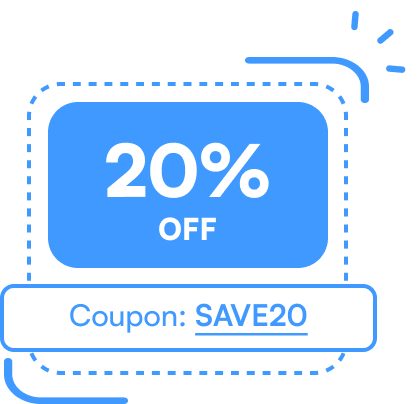If you are looking for ways to increase your customer’s cart value on a single purchase, WooCommerce product add-ons is the answer. These are gentle suggestions offered right on the product page of your store.
Customers love customization and product add-ons by WooCommerce make it easier by offering them extra product choices based on their cart items, purchase history, and preferences. Whether it’s premium upgrades, related products, or freebies, these add-ons significantly maximize your revenue and improve your customer’s shopping experience.
This guide will cover the best product add-on WooCommerce plugins, their comparison chart, and the best strategies to implement one in your store. Let’s get started!
Show add-ons on the product page with UpsellWP’s Product Add-ons campaign and boost your sales today.
Why Implement WooCommerce Product Add-Ons?
Here are some perks you can enjoy by implementing Product add-ons in WooCommerce.
- Add-ons allow you to customize product recommendations based on each customer’s purchase history and interests. This flexibility leads to increased conversion rates and fewer abandoned carts.
- Customers are more likely to spend extra dollars when related products are suggested. Whether it’s WooCommerce extra product options like premium upsells or cross-sell products, these add-on suggestions add up to higher revenue and directly contribute to your store’s average order value.
- More customers yield more sales. However, with product add-on strategies, you can increase WooCommerce sales through existing customers without chasing new customers. This maximizes the store’s profit margin while decreasing customer acquisition costs.
Note: WooCommerce add-ons don’t just increase revenue – they enhance customer experience, streamline operations, and make your store more competitive.
How to Choose the WooCommerce Product Add-On Plugin?
Before selecting a product add-on plugin for WooCommerce, go through this checklist we used to curate the best picks.
1. Features & Customization Options
Look for a plugin that offers diverse add-on types such as text fields, checkboxes, dropdowns, and conditional logic. The more customization options available, the better you can tailor the shopping experience.
2. Pricing Flexibility
A good plugin should allow you to set fixed product discounts, percentage-based and quantity-dependent discounts for add-ons. This ensures better control over profitability and pricing strategy.
3. Compatibility with Your Theme & Other Plugins
Some plugins may not work well with all themes or other essential plugins (e.g., payment gateways, checkout customizations). Always check compatibility and read user reviews before purchasing.
4. User Experience & Mobile Optimization
The plugin should provide a smooth and fast shopping experience, especially on mobile devices. Avoid plugins that slow down your site or make the add-on selection process complicated
5. Performance & Speed Optimization
Heavy plugins can impact site speed, leading to lower conversions. Choose a lightweight plugin optimized for performance.
6. Support & Documentation
A plugin with strong customer support and clear documentation will save you time and frustration. Look for plugins that offer live chat, ticket support, or a detailed knowledge base.
7. Free Vs. Paid: Do you need a Premium Plan?
Many WooCommerce product add-ons free plugins offer basic features, but for advanced options like conditional logic, pricing rules, and image previews, a premium version may be required.
Pro tip: Start with a free version if available, then upgrade if your store needs more advanced functionalities.
Above all, consider your needs and business goals before purchasing a plugin.
Best Product Add-Ons Plugins for WooCommerce: Compared
Here’s a quick comparison chart on the best add-on plugins.
| S.No | Plugin | Best for | Who can use | Pricing |
| 1. | UpsellWP | Product add-ons, cart add-ons, order bumps, and more | Stores looking for personalized product suggestion | Free + Paid |
| 2. | YITH WooCommerce Product Add-Ons | Conditional logic & flexible pricing structure | Stores selling customizable products & services | Free + Paid |
| 3. | PH WooCommerce Product Addons | Reusable add-ons | Stores selling personalized items | Only Paid Plan |
| 4. | WooCommerce Product Add-Ons Ultimate | Global add-on option | Stores selling digital goods, made-to-order items | Only Paid Plan |
| 5. | WooCommerce Product Options Plugin | Live image previews | Stores requiring customer input for product suggestion | Only Paid Plan |
5 Best WooCommerce Product Add-Ons Plugins
The five best product add-ons plugins for WooCommerce are:
- UpsellWP
- YITH WooCommerce Product Add-Ons
- PH WooCommerce Product Addons
- WooCommerce Product Add-Ons Ultimate
- WooCommerce Product Options Plugin
1. UpsellWP
UpsellWP is the best WooCommerce product add-on plugin to suggest upsell products, cross-sells, and related products right on the product page. This way, you can allow customers to add extra items to their cart in one click and checkout directly. Using input fields like checkboxes, customers can personalize their purchases easily.
The plugin offers full customization features to set display locations, and discounts. With its conditional logic, you can display specific add-ons based on customer type, purchase history, and more.
You can also edit the font, design, and content of the add-on template. This way, you can automate the product suggestion method on WooCommerce’s product page.
Additionally, UpsellWP offers features like frequently bought together, order bumps, cart upsells, cart add-ons, upsell popups, next order coupons, and more.
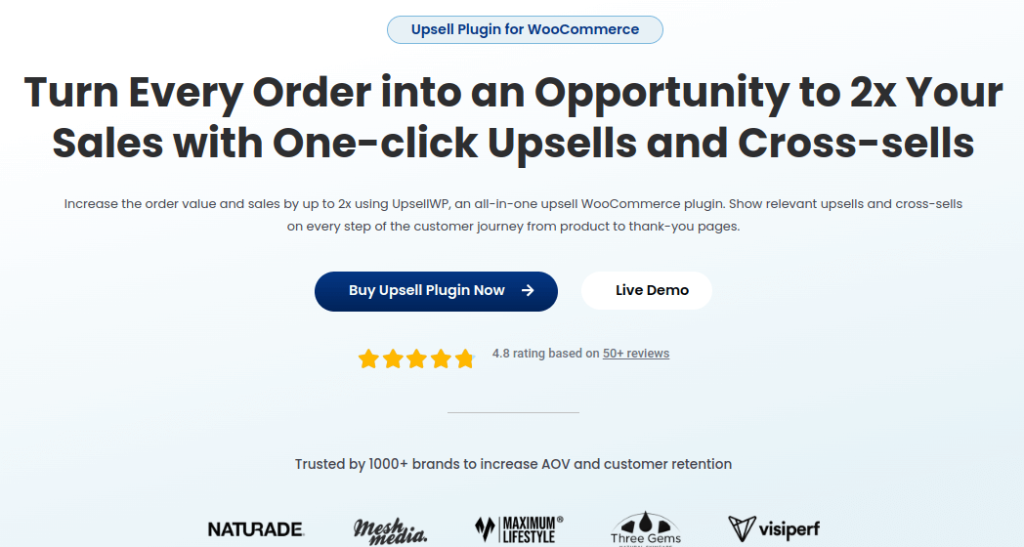
Who can use UpsellWP?
WooCommerce stores of all sizes wanting to suggest personalized product suggestions can choose UpsellWP. Plus, you hold full control over customization.
Pricing
UpsellWP is a free plugin. To access advanced features, get the paid plan for $69 per year.
Suggest add-ons from shop page to thank you page of your store using UpsellWP’s fully customizable upsell features and maximize your AOV.
2. YITH WooCommerce Product Add-Ons
YITH is a free WooCommerce product add-on plugin that enables you to offer customized product options directly on the product page. With various input fields like checkboxes, radio buttons, text areas, and file uploads, customers can personalize their purchases with ease.
This plugin includes conditional logic, letting you show or hide add-on options based on previous selections. Plus, you can set flexible pricing rules, such as fixed price, percentage discount, or free gifts. These features create a dynamic and user-friendly shopping journey.
Moreover, its customization options let you edit the layout, design, and pricing of add-ons.
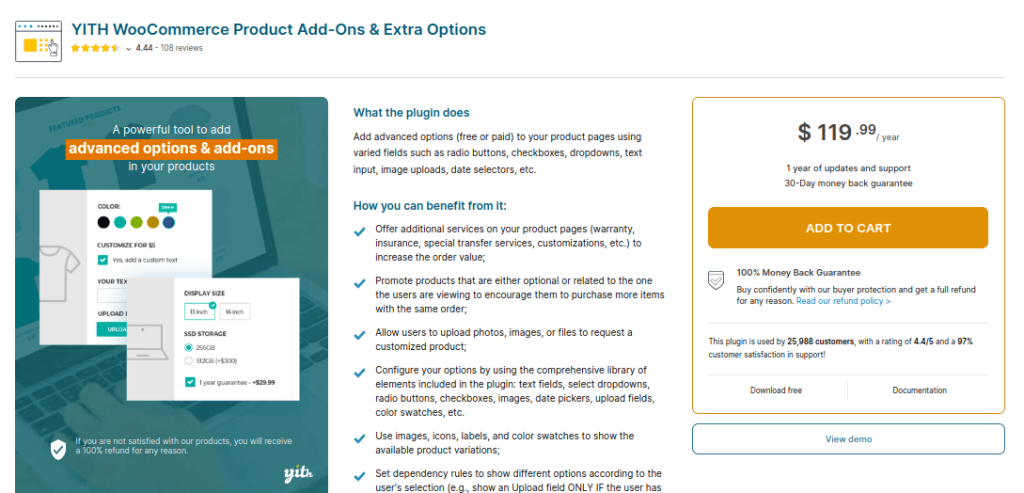
Who can use YITH plugin?
WooCommerce stores looking to sell customizable products or services will benefit from this plugin.
Pricing
It’s a free plugin. Pricing starts from $119.99 per year.
3. PH WooCommerce Product Addons
This is a premium product add-on plugin that enables store owners to add related product options directly on the product pages. It supports dynamic pricing models, allowing you to set fixed or percentage discounts based on add-on quantity.
Additionally, this plugin lets you reuse add-ons across multiple products or categories, thus saving time and ensuring consistency across you store.
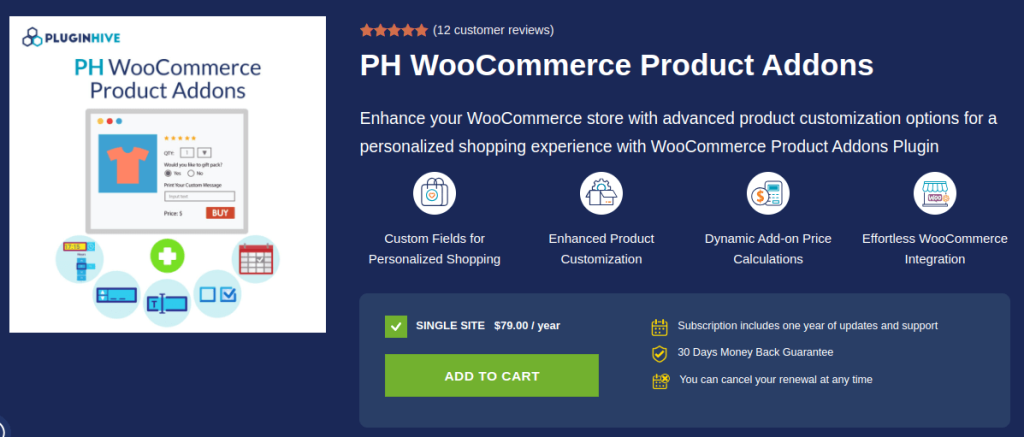
Who can use PH plugin?
This plugin is particularly beneficial for businesses aiming to offer personalized products or services.
Pricing
Paid plan starts from $79/year. It doesn’t contain a free version.
4. WooCommerce Product Add-Ons Ultimate
WooCommerce Product Add-Ons Ultimate is another powerful plugin that offers advanced product customization options directly on the product page. Here, you can create global add-ons, making it easy to apply the same options to multiple products across your store.
Plus, this plugin offers calculation fields, child products, checkbox groups, and file uploads, making it an ideal choice for businesses requiring detailed customer input.
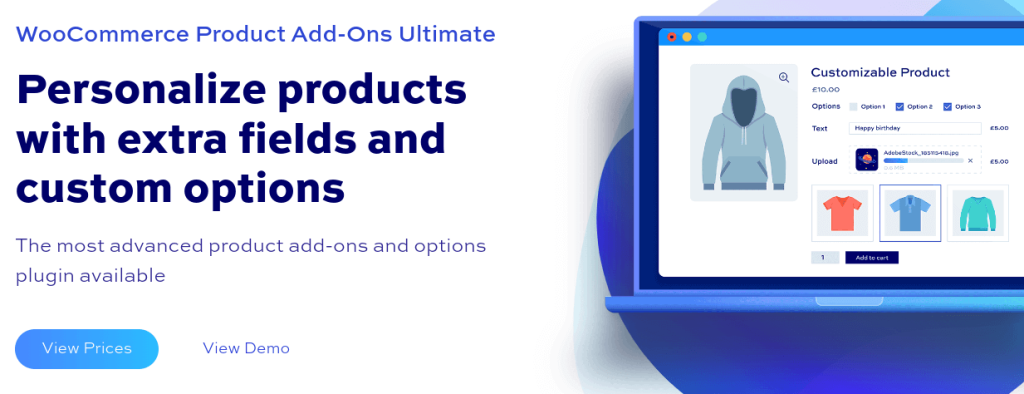
Who can use Product Add-Ons Ultimate?
Stores selling customizable products, digital goods, made-to-order items, or additional services can benefit from using this plugin.
Pricing
Paid plan starts from $69 per year. It doesn’t have a free plan.
5. WooCommerce Product Options Plugin
This Product options plugin for WooCommerce has features similar to the other four plugins we have seen so far. This plugin offers conditional logic and different pricing structure.
It also comes with advanced features like live image previews, allowing customers to see a real-time visualization of their customizations before completing the purchase.
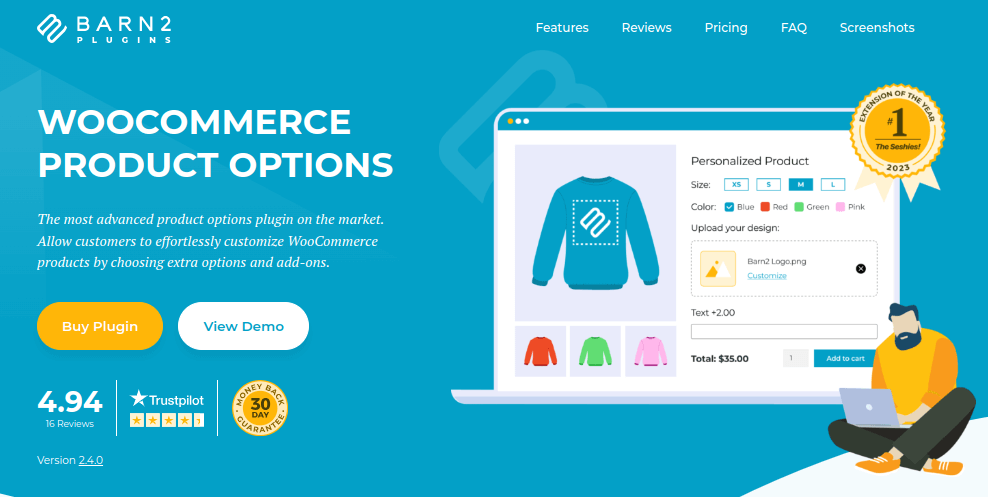
Who can use Product Options Plugin?
Stores requiring customer input for product configurations can go with this plugin.
Pricing
Paid version starts from $99 per year. It doesn’t have a free plan.
Creative Strategies to Suggest Product Add-Ons in WooCommerce
All WooCommerce stores use product add-ons, but you need creative strategies to stand out. Here are some:
1. Implement Personalized Product Recommendations
Analyze customer browsing history and purchase patterns to suggest relevant add-ons. Data and statistics let you offer related products that align with individual customer preferences.
For instance, if a customer frequently purchases fitness equipment, encourage add-ons like resistance bands or workout gloves.
2. Offer Time-Limited Add-On Discounts
Create a sense of urgency by providing limited-time discounts on specific addons. This strategy encourages customers to make quick decisions, increasing the chances of additional purchases.
For instance, you can drive urgency by displaying messages like ‘Add mobile case within the next 10 minutes and get 15% off’
3. Use Customer Feedback for Add-On Development
Engage with customers to gather insights on desired add-ons. Use surveys, reviews, and feedback forms to identify opportunities for new product options that meet customer needs.
Through feedbacks and suggestions from the customer end, you can provide what they truly need and this way you can also make your customers feel exclusive and special.
4. Bundle Add-Ons for Enhanced Value
Create bundles that combine the main product with complementary add-ons at a discounted price. This approach provides value to customers while increasing the average order value.
For instance, offer a smartphone with screen protector and case as a bundle at a lower price than suggesting each item separately.
5. Incorporate Social Proof
Showcase reviews and testimonials specifically for add-ons to build trust and influence purchasing decisions. Positive feedback from other customers can validate the usefulness of the add-ons.
For instance, feature positive feedback right below the add-on suggestion for improving conversions.
6. Gamify Add-Ons with Mystery Upgrades
Create an engaging shopping experience by offering mystery add-ons as a part of the purchase. Customers love surprises and this strategy can encourage more add-on purchases while increasing customer excitement.
For instance, you can suggest free accessories, warranty, or exclusive discounts as a mystery gift.
With these creative ways, you can enhance the appeal of add-on suggestions and improve customer retention.
Upsell and Cross-sell in your store using UpsellWP’s 10+ product suggestion method and increase your profit margins.
Sum Up!
Showing WooCommerce add-on products are practically working way to increase revenue while improving customer experience. When selecting a plugin, focus on features, pricing, compatibility, and performance, and choose the one that fits your requirements.
If you ask us, we would suggest you use UpsellWP as it will equip you with features to offer personalized options, upsells, and customizations that make shopping seamless and engaging. With the right approach, add-ons won’t just boost your sales but create a better and optimized shopping experience for your customers.
Read this detailed guide to show product add-ons in WooCommerce.
Related Guides
- Best WooCommerce Cross-sell Plugins
- Best WooCommerce Upsell Plugins
- Best WooCommerce Frequently Bought Together Plugins
- Best WooCommerrce Popup Plugins
Frequently Asked Question
Yes, many WooCommerce add-ons plugins allow you to set selection limits. You can restrict the number of add-ons a customer can choose using conditional logic or predefined limits in the plugin settings.
Yes, from the conditional settings of UpsellWP, you can set role-based pricing and charge different prices for add-ons based on user roles.
You can set conditions to show or hide add-ons based on selections. You can set conditions based on the product, user, date & time.
Yes, you can create free add-ons by setting their price to zero. This is useful for free services like gift messages, engraving, or special packaging without impacting the cart total.
It depends on your store’s refund policy. Some WooCommerce stores allow partial refunds for add-ons, while others treat them as non-refundable services.
Yes, you can use Google Analytics or WooCommerce Reports to see how often add-ons are selected. Some plugins also offer built-in reports to track add-on sales and conversion rates.

